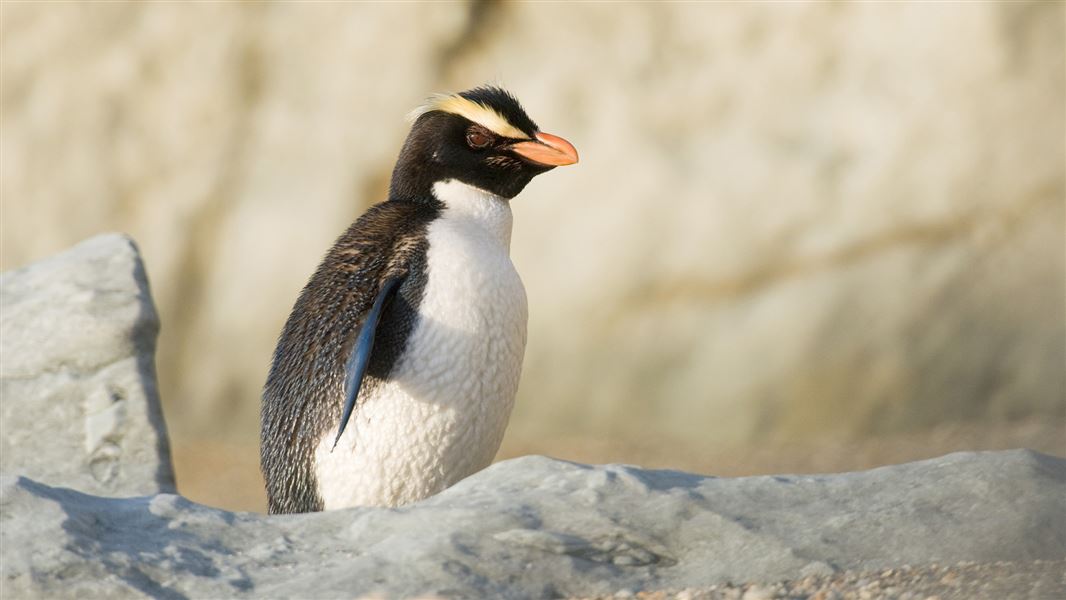Archived content: This media release was accurate on the date of publication.
Date: 02 February 2021
Recently, a dog was seen running loose in the Okahu/Jackson Bay Wildlife Refuge and a short time later, clumps of tawaki feathers were found in the coastal forest beside the Wharekai Te Kou walking track.
A tawaki penguin on another Haast beach has also been handed in by a member of the public who found it injured on the beach, with evidence of being attacked by a dog. The penguin sadly had to be put down.
A wildlife refuge is strictly off limits to all but approved conservation dogs. Wildlife refuges contain either breeding colonies of animals or particularly rare animals, which suffer when dogs enter the area.
Biodiversity Ranger Inge Bolt says people are ignoring the signage at the Wharekai Te Kou track which is a wildlife refuge where dogs are strictly prohibited.
Penguins and other ground dwelling native birds don’t naturally co-exist with dogs, and they can’t escape easily – it takes just a second for a dog to cause a fatal injury to a penguin.
“Responsible dog owners need to read the signs and know where their dog is allowed - particularly in sensitive wildlife areas. In some areas dogs are allowed, but only on a lead.
“People are also ignoring the council signage in the settlement of Jackson Bay requiring dogs to be on a lead. Both of these restrictions are in place to protect the penguins and seabirds that live in this area.
West Coast Penguin Trust Manager, Inger Perkins agrees.
“The Trust has worked hard to ensure consistent messages are presented across the West Coast at beach access points. It is a simple message – keep dogs on leads in coastal vegetation and after dark at the beach. At other times, keep the dog under very close control. Never take them into areas where they are prohibited. We have been working for several years to understand and better manage threats to tawaki. Dogs should not be one of the threats. These penguin deaths were entirely avoidable.”
Haast receives a lot of visitors from the South Island and further afield. Many stay in Air Bnb’s, campgrounds, motels or baches and are here for holidays and weekends. Some people bring their dogs, but a few people are ignoring the rules, and their dogs can have a devastating impact.
Maps detailing areas of dog access and prohibition are available from DOC – either on the website or at visitor centres. If people are unsure, they should seek advice. Dog permits can be obtained from DOC for some areas, depending on the wildlife of that area.
More info
Injured wildlife should be reported to a DOC office or 0800 DOC HOT.
Dog owners could be prosecuted for having their dogs cause injury or death to wildlife. DNA matching can be used to identify the dog(s) responsible.
People can be fined up to $10,000 and be sentenced to a year in prison if they allow a dog to enter a national park or other controlled area such as a wildlife refuge where dogs are banned from entry.
Penguins are susceptible to dog harassment, this can result in changes of behaviour, injury and death. Changes of behaviour will vary according to the time of year:
- During the breeding season (August – December) these include disturbances at nesting sites, interruption of birds going to or from nests, and stopping birds from landing when returning from the sea.
- During the January to March moulting period when birds come ashore to switch out their feathers, disturbance from dogs can force birds to flee into the ocean which can have fatal results as the feathers are not waterproof at this time.
- Birds take refuge in vegetation close to shores and are easy for dogs to find, and it is difficult for owners to see what their dogs are doing if they are not on lead.
Injuries will generally be trauma related from bites by the dog and associated trauma.
When bites are inflicted, the skin is punctured and a massive amount of trauma occurs beneath the wound site, which is not always obvious. If the bird survives the injury initially, infection will often result because of the bacteria present on the dogs teeth.
The majority of birds which receive a deep bite will die later on from infection or starvation. Other injuries may be from exhaustion, overheating, or retreating to the sea when moulting.
If injured wildlife can be caught and assessed by DOC staff then they may be sent on for specialist treatment at a wildlife hospital in Dunedin or Palmerston North.
Contact
For media enquiries contact:
Email: media@doc.govt.nz
